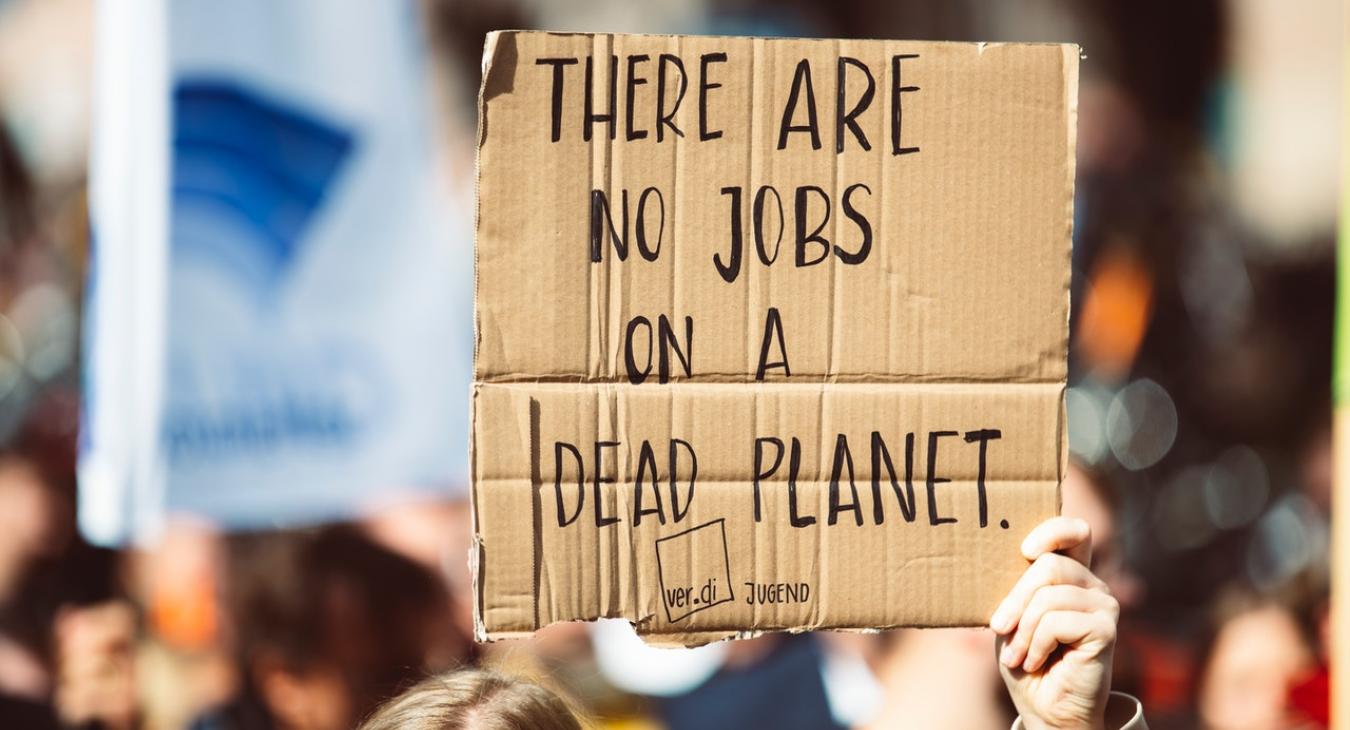
David Joyce looks at the COP21 Summit in Paris and the implications for workers. This blog has been updated in light of the deal reached in Paris and the response from international trade union federations (see below)
Following the passage of motions (44 & 45) at our Biennial Delegate Conference in July, Congress joined with union colleagues from across the globe in support of the People's Climate Marches that took place ahead of the COP21 Summit in Paris.
Both the International Trade Union Confederation and the European Trade Union Confederation have been actively engaged in the process, putting the demands of working people on the agenda with the timely reminder that 'There are no Jobs on a Dead Planet.'
The trade union movement endorsed three top line demands ahead of the Paris gathering, calling on governments to:
- Emphasise the need for a 'just transition' to a carbon free economy in any deal that emerges
- Realise the potential of job creation in the green economy, an issue that Congress has examined in an Irish context publication
- Financial support for the most vulnerable countries
As Sharan Burrow, General Secretary of the ITUC recently pointed out: "The Paris Agreement must set the world on track for zero carbon and zero poverty if we are to see a hopeful future for workers and their communities. Without a commitment to the just transition measures that must underpin the massive industrial transformation that is already happening, workers and their families will pay the price,"
(A full ITUC briefing on COP21 is available here)
The Paris Summit initially showed great promise, with a historic partnership of business, NGOs, faith groups and trade unions signing a commitment to just transition dialogue for a zero carbon future.
But Article 2 of the draft agreement - which deals with human rights, gender rights, indigenous peoples and the 'Just Transition' - soon became a matter of controversy.
Draft texts dismantled it, and some of its provisions were relegated to the preamble.
The stated reason was to shorten and simplify the text. This is difficult to comprehend, coming from the same country negotiators that gave us a 7000 page Trans Pacific Partnership text.
Despite the best union efforts, at the time of writing the Just Transition concept has been relegated to the preamble. But one way or another it has emerged from Paris as a concept with wide support across civil society.
Ireland faces many challenges in relation to climate change – not least in relation to our responsibilities to a reduction of at least 40% in annual emissions (on 2005 levels) by the year 2030.
This has implications in terms of power generation, construction, agriculture and transport.
Agriculture accounts for 29.2% of Ireland's emissions – three times the EU average. It is also a major employer, with almost 170,000 jobs in the agrifood sector. The Taoiseach's contribution during the first week of COP21 came in for strong criticism, with Friends of the Earth stating that: "Beyond the opening aspirations the Taoiseach's speech offered fudge and dodge rather than firm action to make those aspirations a reality."
An UPLIFT petition criticising his assertion that "climate change is not a priority" and urging him "to set ambitious targets to reduce carbon emissions" has attracted almost 5000 signatures.
Business here in Ireland is largely supportive of the European Union position on behalf all 28 member states. But Ibec's Energy Policy Committee does warn that "any further concessions depend on securing comparable efforts from other developed regions to minimise investment leakage."
Some businesses have even gone so far as to sign a pledge calling on political leaders to ensure that a robust agreement emerges from Paris.
There is a broad consensus around the need to make profound changes to our energy systems and to all economic sectors.
But workers have a right to know what their governments and employers' plans are in relation to decarbonising both economies and workplaces and to be equal partners in that process. A just transition will include:
- Wage safeguards and job security for workers involved;
- Skill development and redeployment with decent work alternatives
- Pension guarantees and social protection measures to support people through the transition, and
- Investment in community renewal including the construction and services associated with renewable energy.
Whatever the outcome in Paris, we face significant challenges over the next 30 years and beyond. Trade Unions have taken to the streets globally to make clear that there is no need to choose between jobs and the Environment. We need political will to ensure that no one is left behind in the transition to a zero carbon world. Because unless there is urgent action and concerted action, the consequences will be horrendous for working people and their communities globally.
UPDATED: DEC 22, 2015
The Paris deal recognises the reality of the climate threat, but only takes us part of the way.
Brian Kohler of the global union Industriall characterised the new deal as "an agreement that is weak and imperfect in several areas, but which was the best that could be politically achieved at this moment, and may nevertheless mark a turning point for our civilisation and the planet we live on."
Unions went into the Paris Conference with three key goals:
1. To raise ambition and realise the job potential of climate action
While governments committed to stay well below a 2 degrees trajectory and referenced 1.5 degrees as an ideal pathway, the realisation of that commitment requires greater ambition before 2020 and a review of each national target (and not just a collective assessment) before the agreement comes into force in 2020 – This is missing from the final deal
2. To deliver on climate finance and support the most vulnerable
A sum of $100billion annually is on the table to finance this, with a commitment within that to balance adaptation and emission reductions - but outside the Paris Agreement. This is a small price to pay for saving the human race. The Paris Agreement is weak on this provision.
3. Securing a just transition for workers and their communities
We face the biggest and most rapid industrial transformation in history. While a just transition for workers and the respect of human rights have been included in the preamble to the agreement, too many governments refused to commit to it in the operational sections. It is our view that what is included in the agreement is a first step on which we will build.
Read the full response of the International Trade Union Confederation (ITUC) is available here.
The ITUC has also posted a short video - After Paris: Organising for Just Transition.
In summary, the Paris Agreement establishes a global periodic pledge and review mechanism and the key now is to see what countries and governments actually make of it.
In Europe, structurally reforming the EU Emissions Trading System is an essential element of the European framework in the fight against climate change. In a resolution passed after Paris, the European Trade Union Confederation reiterated the need to better articulate industrial and climate policies, as well as the importance of operationalising the 'just transition' through concrete measures.

